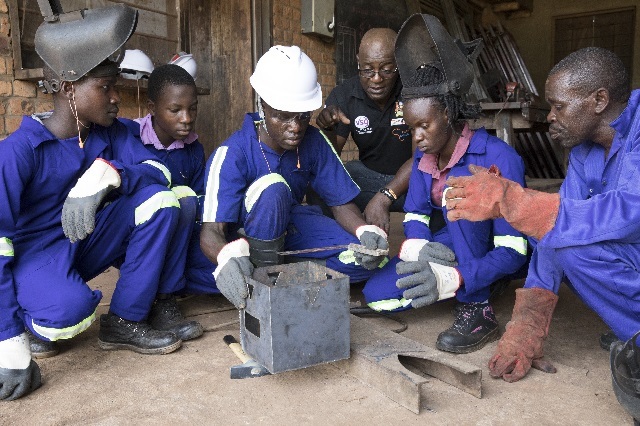
Kampala, Uganda | THE INDEPENDENT | Officials in charge of selecting and placing students in technical and vocational institutions have noticed that students with better grades at O’Level are showing a growing preference for Technical and Vocational Education and Training (TVET) this academic year.
The trend represents a departure from the past when TVET primarily attracted students facing challenges in securing A’Level placement due to poor performance as parents perceived it as a domain for those who had not succeeded academically.
As principals and academic registrars reviewed the applications at Nakawa Vocational Institute, the venue for the central region TVET selections, it was evident that a substantial number of students with first and second grades from the 2023 UCE examinations were prominently represented.
Henry Yiga Bukenya, the Academic Registrar of Ahmed Sseguya Memorial Technical Institute, remarked that the trends have changed because his institute has received applications from students with 18 aggregates- a new developement in this area of study.
“Normally, the best we can get are students with above 40 aggregates,” Bukenya said while sharing with our reporter the applications received from students with first grades. He was scrutinizing a pile of applications to decide on the initial admissions for government sponsorship and private placements. In the process, five students who had achieved first grades were identified from the stack of applications.
In addition to their secondary school results, the academic registrar chose to examine the performance of the applicants at the primary level. To his surprise, it was discovered that many of these applicants were top performers at the primary level as well, with a significant number having obtained first grades.
Dickens Okello, the Academic Registrar of Kakira Community Technical Institute, also acknowledged the trend, emphasizing that there is a positive paradigm shift. He pointed out that this change signifies a shift in perception, as people no longer view TVET as a domain for failures. Instead, it is now seen as an area of opportunity for acquiring skills and lifelong learning.
Eng. Eddy Turyatemba, theAssistant Commissioner in charge of Vocational Education and Training noted that the Ministry has recorded a gradual but consistent increase in better-performing students opting for TVET.
“We are no longer merely a destination or dumping site for those perceived as academically weaker; we prioritize individuals with a genuine interest. Additionally, attracting high-performing students is not detrimental. This indicates a positive reception to technical education,” Eng Turyatemba emphasized.
The Assistant Commissioner mentioned that the majority of such students are found in Western Uganda, where they have even recorded students with a perfect score of 8 in 8 choosing TVET. However, he remarked that other regions are slower in adopting TVET, as they still perceive academic secondary schools and university education as the primary path to excellence.
Goodman Ornan, the Academic Registrar at Nakawa Vocational Training College, further commented that they are now admitting students who have excelled in science subjects more than ever before, a positive development for TVET.
According to him, students with comparatively stronger performances in subjects such as physics and mathematics are adapting quickly to the TVET systems, especially in preferred courses like motor vehicle engineering and electrical engineering.

“For many courses in TVET, there is a direct link to the sciences, and if the learner is well-versed in those subjects, it proves advantageous,” he remarked. Ornan commended the increasing number of students with better performance choosing TVET. However, he highlighted the need for more sensitization, noting that many parents are still unaware of TVET and its potential benefits.
Harriet Kagezi, the Principal of Ntinda Vocational Training Institute emphasized that while preference is given to those with better academic performance, vocational training is still open to everyone and students with what is seen as less impressive results in national examinations are still provided with an opportunity as long as they demonstrate an interest in TVET.
According to her, many students labelled as poor performers have excelled in TVET, even surpassing their peers in science-based courses. She attributed this success to the fact that these students may not necessarily lack intelligence, but rather the traditional teaching methods of sciences and other subjects may not suit them well.
“In TVET institutes, the training is predominantly hands-on, and the limited theory is easily connected to practical applications. This approach contributes to the improved performance of students who may have struggled in conventional academic settings,” the principal said.
Kagezi said that in the past, there was a prevalent bias and ignorance regarding the TVET system. According to her, the TVET system provides a viable professional development path for learners. She points out that through TVET, one can undergo training for a national certificate within two years. After completing this initial stage, individuals have the option to either enter the workforce immediately or continue learning to achieve a diploma.
Kagezi noted that individuals can concurrently study and work. Upon obtaining a Diploma, they can even pursue university education in fields related to their progression, such as engineering and similar disciplines. She added that individuals who choose the TVET path accumulate practical skills that someone who goes to the university directly from the A’Level may not attain by the time they reach the university level.
As part of TVET reforms, the Ministry of Education is proposing the establishment of a National Technical University. This initiative aims to provide a clear progression for students who choose to study TVET programs. Through this establishment, individuals would have the opportunity to advance in their field and potentially achieve a Ph.D. within their trade.
Besides the noticeable shift of more high-achieving students choosing TVET, the overall number of applicants is also on the rise. although the exact number of applicants to government institutes has not been confirmed yet, it is estimated that over 20,000 students submitted their applications seeking to be admitted. There are 20,670 available slots across 85 institutions nationwide of which the government is willing to pay fees for only 2,469.
Dickens Okello mentions that last year his institute received 300 applications during the selection process, but this time around, they have already counted 500 applications in the second cycle of this year.
However, he points out that the government is currently allocating a limited number – 50 in each institute. With the increasing trend, he emphasizes the necessity for the government to expand support for these institutions. This includes providing more facilities for training, increasing the number of instructors, and ensuring the availability of other amenities to sustain the growing numbers.
Unlike any other selection process, this year saw several parents and students actively seeking information at the selection centre on how their learners can join and which institution would be suitable for them.
One such parent is Brenda Nyadei Tanga. During the interview, she mentioned that she had heard about the process but had some lingering questions that she wanted answers to. Nyadei expressed her positive inclination towards the TVET path for children, and from the conversation, it became clear that she was considering allowing one of her young children to pursue the TVET path after completing primary seven.
Learners who choose the TVET path after completing primary seven typically enrol in community polytechnics, where they undergo a three-year program. Upon completing this stage, learners have the option to further their studies by pursuing a National Certificate at a selected vocational institution, alongside students who have completed their Senior Four education.
*******
URN
 The Independent Uganda: You get the Truth we Pay the Price
The Independent Uganda: You get the Truth we Pay the Price



Detailed News
Thanks